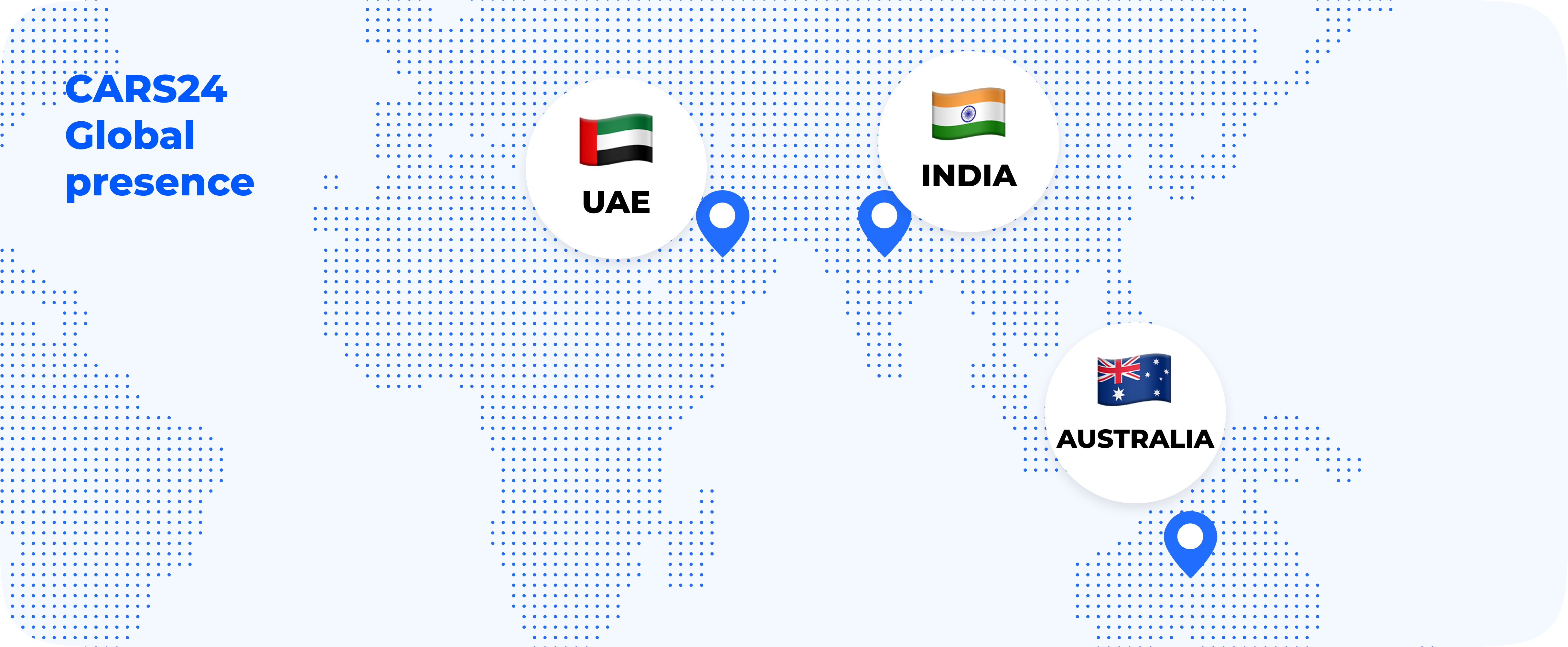Going Global: Lessons from CARS24’s Int'l Expansion (Part 1)
There are very few startups — let alone, unicorns — from India that have managed to go global in a true sense. To dig deeper, there are very few that have reached profitability on foreign shores. In this regard, CARS24 enjoys a rather unique position in our ecosystem. Our story started about a decade ago and we’d been quite keen on introducing ourselves to a global audience, and not restricting ourselves only to India. This mindset flows accurately with our vision of ‘better drives, better lives’ — a philosophy that transcends boundaries and unites humankind with a positive impact.
In this blog series, I’ll be sharing some of the salient doubts around stepping onto foreign shores while highlighting what worked for CARS24 (and what may or may not work for you), and some of the lessons that we learned as an org in this journey.
 Introduction
Introduction
Expanding a business internationally is often considered a milestone of success. However, for startups, venturing into rather unfamiliar territories comes with significant risks. As an Indian startup, CARS24 took the plunge and successfully expanded into the UAE and Australian markets. Turns out we were not the first ones to venture outside our comfort zone: several Indian startups before us have attempted international expansion, driven by ego or ambition, only to retreat when the complexities outweigh the gains. This blogpost primarily explores the four key insights that came out of conversations with multiple founders that helped CARS24 succeed and offers a framework for other companies considering a similar path.
 Is International Expansion a Core Bet or a Side Bet: The first and most important filter is determining whether international markets are a core part of your business strategy or merely a side bet. If a new geography contributes only 5-10% to your overall business, it’s often not worth the complexity and risk. For startups in a large market like India, focusing on domestic opportunities can yield better returns. For CARS24, the equation was clear. The Indian used car market stands at $25-30 billion. However, the combined market size of the geographies we were targeting—UAE and Australia—scaled over $100 billion. This made international expansion not just an attractive opportunity but a core component of our future. We envisioned a future where 50% of our business could come from international markets, making the risks worthwhile.
Is International Expansion a Core Bet or a Side Bet: The first and most important filter is determining whether international markets are a core part of your business strategy or merely a side bet. If a new geography contributes only 5-10% to your overall business, it’s often not worth the complexity and risk. For startups in a large market like India, focusing on domestic opportunities can yield better returns. For CARS24, the equation was clear. The Indian used car market stands at $25-30 billion. However, the combined market size of the geographies we were targeting—UAE and Australia—scaled over $100 billion. This made international expansion not just an attractive opportunity but a core component of our future. We envisioned a future where 50% of our business could come from international markets, making the risks worthwhile.
 Autonomy vs. Centralisation: Launching in a new market is a 0-to-1 battle, very different from scaling an existing operation. One of the biggest pitfalls for companies is trying to manage international expansion through a centralised, matrix-style structure. While centralisation can reduce redundancies, it often stifles the autonomy required for new ventures to thrive. At CARS24, we adopted a different approach. Each market—India, UAE, and Australia—has its own fully independent team. These teams are empowered to make decisions tailored to their specific markets, even if it means repeating efforts. The trade-off? While autonomy may increase costs, it ensures the focus and agility needed to succeed. As a founder, I am the only person actively involved across all markets, while every other team member is dedicated to a single geography.
Autonomy vs. Centralisation: Launching in a new market is a 0-to-1 battle, very different from scaling an existing operation. One of the biggest pitfalls for companies is trying to manage international expansion through a centralised, matrix-style structure. While centralisation can reduce redundancies, it often stifles the autonomy required for new ventures to thrive. At CARS24, we adopted a different approach. Each market—India, UAE, and Australia—has its own fully independent team. These teams are empowered to make decisions tailored to their specific markets, even if it means repeating efforts. The trade-off? While autonomy may increase costs, it ensures the focus and agility needed to succeed. As a founder, I am the only person actively involved across all markets, while every other team member is dedicated to a single geography.
 Founder’s Time – The Ultimate Signal of Importance: Founders’ commitment is the strongest indicator of a company’s priorities. If international expansion is a core strategy, it should reflect on how the leadership spends their time. For CARS24, this was a turning point. Recognising the importance of global markets, I shifted nearly 100% of my focus to international expansion. This decision wasn’t about glorifying the founder’s role but about setting the tone for the organisation. When the founder prioritises a strategy, it signals its importance to the entire team and ensures alignment across the organisation. It also puts across the message that we are taking this bet very seriously.
Founder’s Time – The Ultimate Signal of Importance: Founders’ commitment is the strongest indicator of a company’s priorities. If international expansion is a core strategy, it should reflect on how the leadership spends their time. For CARS24, this was a turning point. Recognising the importance of global markets, I shifted nearly 100% of my focus to international expansion. This decision wasn’t about glorifying the founder’s role but about setting the tone for the organisation. When the founder prioritises a strategy, it signals its importance to the entire team and ensures alignment across the organisation. It also puts across the message that we are taking this bet very seriously.
 Building a Team with a Founder’s Mindset: Expanding into a new country means navigating unknown territory, understanding unique customer behaviours, and overcoming local challenges. To do this successfully, you need a team with a founder’s mindset—people who are motivated, resourceful, and relentless in their pursuit of success. At CARS24, we were fortunate to have a strong internal talent pool and the ability to attract external hires who shared this mindset. These individuals were crucial in driving our success in the UAE and Australia. Their passion, commitment, and entrepreneurial spirit made them the backbone of our international operations.
Building a Team with a Founder’s Mindset: Expanding into a new country means navigating unknown territory, understanding unique customer behaviours, and overcoming local challenges. To do this successfully, you need a team with a founder’s mindset—people who are motivated, resourceful, and relentless in their pursuit of success. At CARS24, we were fortunate to have a strong internal talent pool and the ability to attract external hires who shared this mindset. These individuals were crucial in driving our success in the UAE and Australia. Their passion, commitment, and entrepreneurial spirit made them the backbone of our international operations.
Final thoughts
Let’s be honest here, international expansion is not for every company. It requires careful assessment, strategic focus, and relentless execution. At CARS24, our approach was guided by the above mentioned four principles, which helped us build a strong foundation in the UAE and Australia. While addressing these four may not guarantee success (more on that in another blog), the absence of these is a sureshot recipe of failure.
For companies contemplating a global journey, the key is to ask the tough questions, commit fully, and build a solid team. With the right approach, international markets can transform from a risky gamble into a game-changing opportunity.
Loved this article?
Hit the like button
Share this article
Spread the knowledge
More from the world of CARS24
CarInfo is now part of CARS24
We have always believed in simplifying car ownership and together we can make it a 100x better experience for vehicle owners.
Our City Is Choking Our Families
Delhi does not need awareness, it needs discipline. We need a government that’s willing to be disliked for the right reasons and citizens willing to be disrupted.
Best Job Opening in the UAE
As the market evolves, we expect this way of thinking to become standard and this policy to be extremely ordinary. Quality and accountability always find their way to each other.